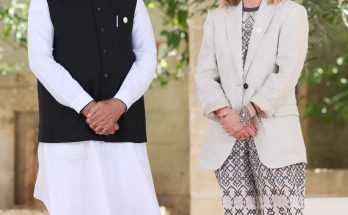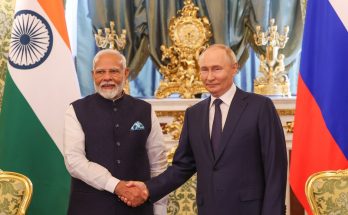
Is it time for the UN Security Council to get a female boss? Yes – the answer is a loud yes if one goes by what India’s Minister for Women and Child Development Smriti Irani said at a recent global conference in New Delhi.
In a panel discussion at the 9th Raisina Dialogue titled “Her Road from India: From Boardrooms to Global Institutions” at the Raisina Dialogue, Mrs Irani vigorously batted for the first female UN Secretary-General and highlighted her government’s focus on bringing women to the main table. “A solution (for global security and peace problems) is found at the UN with a female secretary general,” said Mrs Irani as the audience cheered loudly.
“PM Modi institutionalised women’s voice at the G20, and that’s India’s message to the world that if you are thinking of the future, you cannot think of it without women and girls having an equal seat at that global table,” said Mrs Irani. She also showcased substantial progress made under the leadership of India’s Prime Minister Narendra Modi and the quest to cover longstanding gaps in gender equality to manifest better outcomes for the Indian polity, economy, and society. The session was moderated by Mr Shombi Sharp, UN Resident Coordinator, India.
Dr Ayoade Alakija, WHO special envoy for the ACT-Accelerator, underscored the crucial role played by male allies in this process. She called for the UN Secretary-General to step down in response to her pledge for parity. “He (Secretary-General Guterres) could actually make history by stepping down like a true ally and having a woman step up. That would be a very powerful signal,” said Dr. Alakija.
British parliamentarian Angela Rayner, Shadow Deputy PM of the UK, echoed Irani’s sentiments and emphasised the pivotal role of women in driving economic growth and advocated gender parity in legislative bodies. While sharing her personal story, Rayner also touched upon the state’s role in empowering first-generation women leaders.
“In the UK, we have achieved gender parity in legislative bodies, with 50 per cent of legislators being women,” Ms Rayner said, drawing attention to the importance of such representation in ensuring effective governance.
In the past three decades, conflict-related violence has been at its highest, as per the Peace Research Institute Oslo figures. Many conflicts found myopic solutions, which turned out to be unsustainable and eventually relapsed, as observed in the Middle Eastern conflict recently. At the same time, the UN’s effectiveness has often been called into question when it comes to preventing wars and maintaining lasting peace.
As the peacekeeping efforts seem to be ineffective, the panellists suggested that an obvious explanation might be the lack of women’s participation in the process. The Rwandan experience is an example of this phenomenon across its three civil wars. The first two conflicts ended in relapse, where the women occupied a very low percentage of the parliamentary seats. The country found stability as that share increased and is currently the highest in the world at 64 per cent.
A cross-national study published in the International Studies Quarterly suggests that higher levels of female participation in parliament reduce the risks of intrastate conflict. Another one in the Journal of Conflict Resolution found that as the percentage of women in parliament increases by five per cent, a state is five times less likely to use violence while facing an international crisis.
There is indubitable evidence to show that women succeed as negotiators and mediators in peace and security processes. However, UN Women statistics found that just 2.4 per cent of mediators, 9 per cent of negotiators, and just 4 per cent of the signatories are women. Women have been routinely excluded from the field of peace and security.
Maggie Sprenger, an entrepreneur and venture capitalist, argued that gender diversity in a room statistically drives the alpha, and women in the room lead to better outcomes. “Women need to be included in a more deliberate and thoughtful way,” said Ms Sprenger. “It remains a mystery to me as to why we perceive women in policy and tech as an anathema to success,” she added.
There have been multiple scenarios in recent history where women have effectively built and rebuilt peace and security in post-conflict societies. Women in Somalia and South Africa have earned a reputation for being masters at it. Somehow, the world still grapples with understanding the crucial importance of bringing women into the decision-making processes and institutions.
The panellists unanimously agreed that gender parity is still a long-distance journey.
(Deepakshi Bhardwaj contributed inputs for this article.)
Author Profile
- India Writes Network (www.indiawrites.org) is an emerging think tank and a media-publishing company focused on international affairs & the India Story. Centre for Global India Insights is the research arm of India Writes Network. To subscribe to India and the World, write to editor@indiawrites.org. A venture of TGII Media Private Limited, a leading media, publishing and consultancy company, IWN has carved a niche for balanced and exhaustive reporting and analysis of international affairs. Eminent personalities, politicians, diplomats, authors, strategy gurus and news-makers have contributed to India Writes Network, as also “India and the World,” a magazine focused on global affairs.
Latest entries
 In ConversationJuly 26, 2024India-Italy defence collaboration can extend to third countries: Anil Wadhwa
In ConversationJuly 26, 2024India-Italy defence collaboration can extend to third countries: Anil Wadhwa In ConversationJuly 23, 2024Italy views India as a key partner in Indo-Pacific: Vani Rao
In ConversationJuly 23, 2024Italy views India as a key partner in Indo-Pacific: Vani Rao DiplomacyJune 29, 2024First BRICS unveils a roadmap for boosting tourism among emerging economies
DiplomacyJune 29, 2024First BRICS unveils a roadmap for boosting tourism among emerging economies India and the WorldJune 11, 2024On Day 1, Jaishankar focuses on resolving standoff with China
India and the WorldJune 11, 2024On Day 1, Jaishankar focuses on resolving standoff with China






